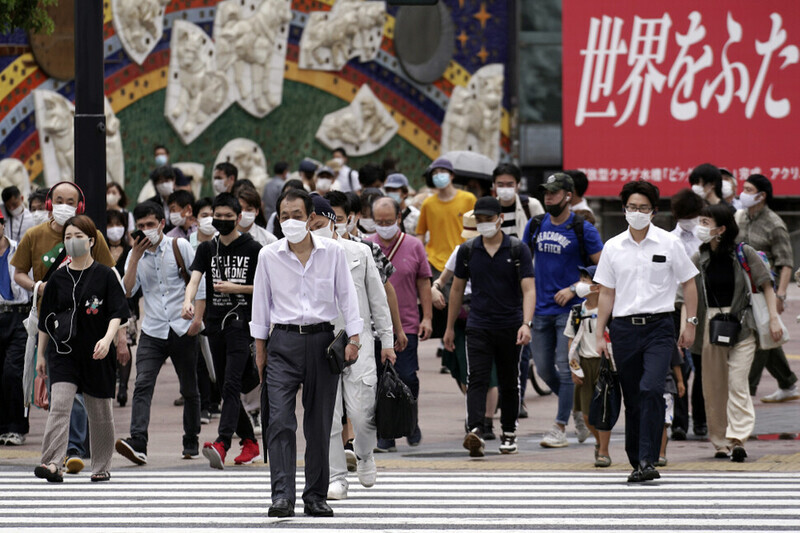hankyoreh
Links to other country sites 다른 나라 사이트 링크
Tokyo sees rise in COVID-19 cases one month ahead of Olympics

With COVID-19 cases on the uptick in Tokyo, more people in the Japanese government are calling for an extension of the city’s quasi-emergency status, Japanese newspaper the Yomiuri Shimbun reported Sunday. Anxiety is growing because of the direct impact a new wave of COVID-19 would have on the Tokyo Olympics, which is less than a month away, including the number of spectators allowed to attend the events.
Tokyo is one of seven administrative areas in Japan under quasi-emergency status through July 11, after full emergency status ended on June 21. In a quasi-emergency, local officials are allowed to impose strict quarantine measures, such as shortening hours of operations at restaurants.
The problem is that Tokyo’s floating population has increased since the full emergency was lifted, accompanied by a rise in the capital’s daily COVID-19 caseload.
Tokyo reported 534 new cases of COVID-19 on Saturday, up 145 from the week before (388). There was a rapid surge in cases from June 21 (236), when the emergency was lifted, and June 23 (619). Since then, the caseload has remained between 500 and 600, with 570 cases on Thursday and 562 on Friday.
The average number of daily cases over the past week is over 100 higher than in the previous week.
“If the number of new cases in Tokyo continues to trend upwards, experts could request the declaration of a third state of emergency,” the Yomiuri Shimbun reported.
“The current trend is that new cases are increasing in the greater Tokyo area. We need to consider tough measures, such as halting the provision of alcohol,” Minister of Economic Revitalization Yasutoshi Nishimura said, during an appearance on NHK. Nishimura is in charge of Japan’s response to COVID-19.
Restaurants in Tokyo and other areas under a quasi-emergency have to close their doors at 8 pm. They’re allowed to sell alcohol through 7 pm under certain conditions.
“If necessary, we should swiftly and unhesitatingly declare a full emergency in areas under a quasi-emergency,” Nishimura also said.
The Japanese government plans to decide whether to extend the quasi-emergency in Tokyo and other areas on July 8.
Extending the quasi-emergency would inevitably create obstacles for the Tokyo Olympics, which are less than a month away. The opening ceremony of the games is scheduled for July 23.
The Japanese government plans to allow up to 10,000 people to attend Olympic events, provided that the quasi-emergency status is lifted.
“All factors in evidence — including the increase in the floating population and the spread of the Delta variant of the coronavirus — suggest that COVID-19 cases in Tokyo will go up. The Olympic events may end up being held with nobody in the stands,” said the Sankei Shimbun, another Japanese newspaper.
After the highly contagious Delta viral variant was recently detected among foreign athletes who have arrived in Japan to take part in the Olympic Games, the Japanese government decided to toughen its countermeasures.
“Athletes from countries where Delta is widespread will have to submit the results of COVID-19 tests taken every day for a week before leaving the country. The new rule goes into effect on July 1,” the Yomiuri Shimbun said.
The rule applies to six countries: India, Sri Lanka, Nepal, Pakistan, the Maldives and Afghanistan.
Meanwhile, Thomas Bach, president of the International Olympic Committee, will be visiting Japan on July 9 to kick off his itinerary leading to the opening of the Summer Games.
Kyodo News reported that Bach, following his arrival in Japan, hopes to visit Hiroshima, one of the cities struck by an atomic bomb in World War II.
By Kim So-youn, staff reporter
Please direct comments or questions to [english@hani.co.kr]

Editorial・opinion
![[Column] Season 2 of special prosecutor probe may be coming to Korea soon [Column] Season 2 of special prosecutor probe may be coming to Korea soon](https://flexible.img.hani.co.kr/flexible/normal/500/300/imgdb/original/2024/0426/3317141030699447.jpg) [Column] Season 2 of special prosecutor probe may be coming to Korea soon
[Column] Season 2 of special prosecutor probe may be coming to Korea soon![[Column] Park Geun-hye déjà vu in Yoon Suk-yeol [Column] Park Geun-hye déjà vu in Yoon Suk-yeol](https://flexible.img.hani.co.kr/flexible/normal/500/300/imgdb/original/2024/0424/651713945113788.jpg) [Column] Park Geun-hye déjà vu in Yoon Suk-yeol
[Column] Park Geun-hye déjà vu in Yoon Suk-yeol- [Editorial] New weight of N. Korea’s nuclear threats makes dialogue all the more urgent
- [Guest essay] The real reason Korea’s new right wants to dub Rhee a founding father
- [Column] ‘Choson’: Is it time we start referring to N. Korea in its own terms?
- [Editorial] Japan’s rewriting of history with Korea has gone too far
- [Column] The president’s questionable capacity for dialogue
- [Column] Are chaebol firms just pizza pies for families to divvy up as they please?
- [Column] Has Korea, too, crossed the Rubicon on China?
- [Correspondent’s column] In Japan’s alliance with US, echoes of its past alliances with UK
Most viewed articles
- 1After election rout, Yoon’s left with 3 choices for dealing with the opposition
- 2Why Kim Jong-un is scrapping the term ‘Day of the Sun’ and toning down fanfare for predecessors
- 3Two factors that’ll decide if Korea’s economy keeps on its upward trend
- 4Noting shared ‘values,’ Korea hints at passport-free travel with Japan
- 5AI is catching up with humans at a ‘shocking’ rate
- 6Why Korea shouldn’t welcome Japan’s newly beefed up defense cooperation with US
- 7‘We must say no’: Seoul defense chief on Korean, USFK involvement in hypothetical Taiwan crisis
- 8[Column] Season 2 of special prosecutor probe may be coming to Korea soon
- 9Korea’s 1.3% growth in Q1 signals ‘textbook’ return to growth, says government
- 10Exchange rate, oil prices, inflation: Can Korea overcome an economic triple whammy?